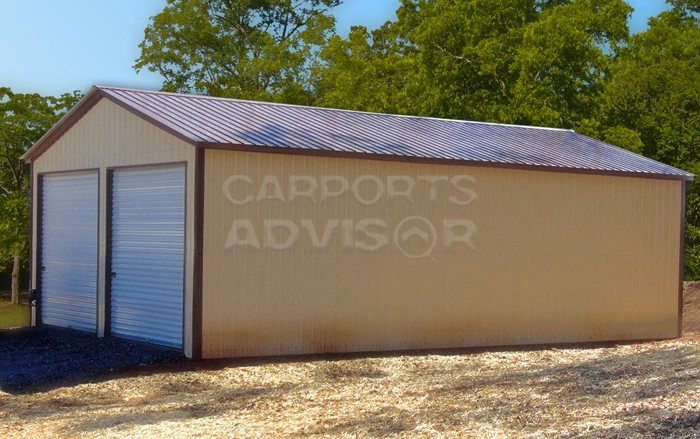Insulated metal buildings have become popular among American farmers and ranchers lately. One key reason is due to their high durability and ability to withstand harsh weather conditions. Whether it is snow, intense heat, or strong winds, metal barns can protect a farm’s valuable tools & equipment easily. Moreover, insulated steel barns and livestock shelters offer superior energy efficiency, which cuts down heating & cooling costs. Let’s see what insulators are, which ones are suitable for metal farm barns, and what their benefits are.
What Are Insulators?
Insulators are materials that reduce heat transfer to and from the building. It also helps reduce condensation and mold & mildew growth inside the metal farm barn. Some common insulators used in steel storage buildings are:
| Insulation Material | R-Value Per Inch | Flammable | Eco-Friendly |
| Mineral Wool | R 3.1 | No | Yes |
| Cellulose | R 3.7 | No
[when treated with boric acid] |
Yes |
| Fiberglass [common] | R 3.1 | No | Yes |
| Cork | R 3.6 to R 4.0 | No | Yes |
| Insulated Metal Panels [IMPs] | R 5 to R 8 | No | Yes |
| Spray Foam | R 3.5 [open cell]
R 6 to R 7 [closed cell] |
Yes | No |
What Is The R-Value Of Metal Building Insulation?
The R-value of an insulator tells us about its thermal resistance rating. The higher the R-value, the better it is. The best R-value per inch is between R4 and R6.5 per inch of thickness.
How good is R17 insulation? It is good enough for most American farm buildings except for areas with heavy snowfall.
What Are The Insulators Used In Metal Farm Buildings?
Generally, fiberglass batts and mineral wool [e.g., woven R17] are considered the best as they are effective, affordable, and easy to install.
If you are wondering how thick metal building insulation is, the thickness generally varies with the type of insulator used, but here’s a general description.
|
|
|
|
|
|
|
|
|
Generally, the R-value ranges between R8 to R30. The standard insulation for exterior walls is between R13 and R23, while for ceilings and attic, R30 to R49 is generally preferred depending on location.
Benefits Of Using Insulator In Farm Metal Buildings
Cost Saving On Energy Bills
Insulation effectively reduces heat transfer through walls, roofs, and other parts of the building. During summer, it helps in keeping heat out and reduces the need for cooling, while in winter, it helps retain heat inside, lowering heating costs.
The HAVC system can perform better with insulation as the need for frequent heating or cooling reduces. This leads to less power consumption, reducing energy bills. Insulation also seals any air gaps, especially around the joining part of two metal panels. This further reduces energy wastage.
Improve Temperature Control
By reducing heat transfer, insulated metal barns keep heat from entering inside in summer and from escaping outside in winter. This helps maintain stable indoor temperature. Insulation also reduces air drafts, which can be caused by sudden temperature fluctuation.
It makes indoors ideal for farm & ranch workers, storing hay, feed, and crops, and for livestock housing.
Increases Resistance To Pests, Mold, & Fire Hazards
By reducing condensation, the insulator minimizes the chances of pathogen build-up, such as molds & mildew. Adding ventilation along with insulators is the best option for large metal barns and steel livestock buildings, as they help regulate internal temperature, moisture, and humidity levels.
They also remove any foul and pungent smell from fecal matter or urine and bring in a fresh breeze of air. You can choose windows as ventilation for airflow and natural lighting.
Sound Proof The Structure
One of the advantages of installing an insulator is that it blocks sound from inside and outside of a farm building. The insulator absorbs sound waves from bouncing around, reduces echo, and creates a quicker atmosphere.
So, if you are using a metal barn as a farm workshop, it will reduce noise from machinery and tools, and if you have installed a metal livestock barn, it will reduce outside noise from rain and hail storms and will comfort animals. Some insulation materials, such as mineral wool and spray foam, dampen vibrations.
Common insulation materials for soundproofing are:
- Fiberglass
- Mineral wool [excellent soundproofing]
- Spray form
- Cellulose
Why Choose An Insulated Farm Steel Building?
Comfortable Indoors For Workers & Livestock
With insulated metal buildings, farm and ranch workers can work effectively without fatigue, and animals can rest peacefully. A good atmosphere and thermal comfort can boost milk production. Poultry and horses also need specific indoor temperatures in colder regions.
Quick & Efficient Construction Process
Prefab metal farm buildings are quick to install and need less labor than traditional structures. These buildings are made in factories under strict and monitored conditions, so they are uniform in density, material strength, and quality. A metal barn can easily be assembled on-site and gives early access to farmers and ranchers for running operations, reducing downtime.
Durability & Longevity Of Metal Construction Materials
Insulation reduces the chances of condensation, moisture development, and humidity level. This makes a steel storage building rust-resistant and prolongs its life. Structural steel buildings are generally recyclable and can be reused endlessly without losing their strength and durability.
Once installed correctly, steel barns need less upkeep to thrive. Farmers don’t need monthly termite inspection and control, nor do they need to re-coat or re-paint the entire building annually. A 100% galvanized steel can resist rust and corrosion. Cleaning them is also easy with warm water, a garden hose with a nozzle, and mild soap.
Safe Storage For Perishable Items
Farmers like to store hay bales, feed, and crops in the barn until their prices increase to get maximum profit. A steel barn can protect a farmer’s hard work by not allowing pathogens to thrive and molds to grow. Rodents can’t chew through the metal panels to enter inside for nesting in hay bales or infecting crop sacks.
Many agribusinesses use clear-span metal buildings for dairy processing, food factories, and manufacturing & storing perishable products to increase their shelf life under a regulated environment.
Which Part Of The Farm Steel Barn Must Be Insulated?
| 1. Roof | : ~ 30 to 35% of energy loss |
| 2. Ceilings | : ~ 20 to 25% of energy loss |
| 3. Walls | : ~ 25 to 30% of energy loss |
| 4. Doors & Windows | : ~ 30 to 35% of energy loss |
| 5. Install Vapor Barrier | : ~ 05 to 10% of energy loss |
A vapor barrier is installed on the inner side of the insulator to help prevent moisture from causing pathogen growth. Some insulators come with vapor barrier properties, so you don’t have to install them separately.
Elevate Your Agribusiness With An Insulated Metal Building
You can easily customize a metal barn with insulation to meet your specific needs of farm or ranch operations. Steel agricultural buildings can be designed for different sizes, designs, layouts, and additional features that make the barn a cost-effective and reliable solution for all. Metal barn with insulation improves operations, productivity, and sustainability.






